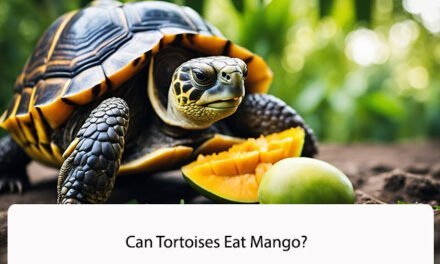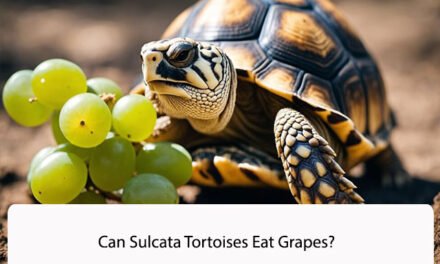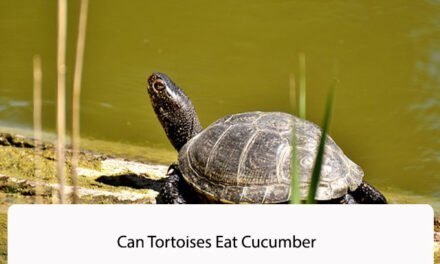Tortoises are herbivorous reptiles that enjoy munching on a variety of fruits and vegetables. As a result, many tortoise owners wonder if watermelon is a suitable addition to their pet’s diet. In this article, we will explore whether tortoises can eat watermelon and if it is a healthy choice for them.
Watermelon is a delicious and refreshing fruit that is rich in vitamins and minerals. But can tortoises safely consume this juicy treat? While tortoises can eat watermelon, it should only be given to them in moderation. Watermelon contains a lot of sugar, which can cause digestive issues and lead to obesity if consumed in excess. It is important to remember that tortoises require a balanced diet that includes a variety of fruits, vegetables, and other foods to ensure their overall health and well-being.
In the following paragraphs, we will delve deeper into the nutritional value of watermelon and how it can benefit or harm your tortoise’s health. We will also provide recommendations on how to properly feed watermelon to your pet and what to look out for to ensure they remain healthy and happy.
Understanding Tortoise Diet
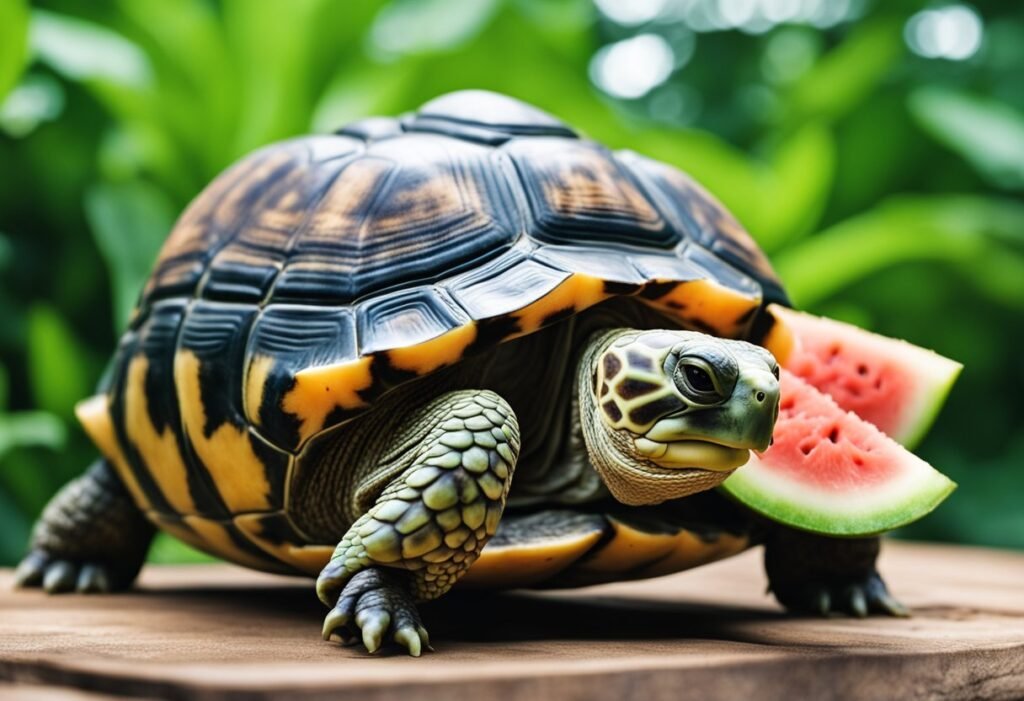
When it comes to feeding our tortoises, it is important to understand their natural diet. Tortoises are herbivores, and their diet should consist of a variety of vegetables, fruits, and leafy greens.
In the wild, tortoises have access to a wide variety of plants, and they are able to select the ones that provide the nutrients they need. However, in captivity, it is up to us to make sure they are getting a balanced diet.
It is important to note that not all fruits and vegetables are suitable for tortoises. Some can be harmful and even toxic. Therefore, it is important to do research and seek advice from a veterinarian or an experienced tortoise keeper before introducing new foods to their diet.
One fruit that is often debated among tortoise keepers is watermelon. While it is a refreshing and hydrating treat, it is also high in sugar and lacks some of the essential nutrients that tortoises need. Therefore, watermelon should be given in moderation as a treat rather than a staple in their diet.
Overall, a balanced and varied diet is key to keeping our tortoises healthy and happy. By providing them with a mix of vegetables, fruits, and leafy greens, we can ensure they are getting all the nutrients they need to thrive.
Watermelon and Tortoises
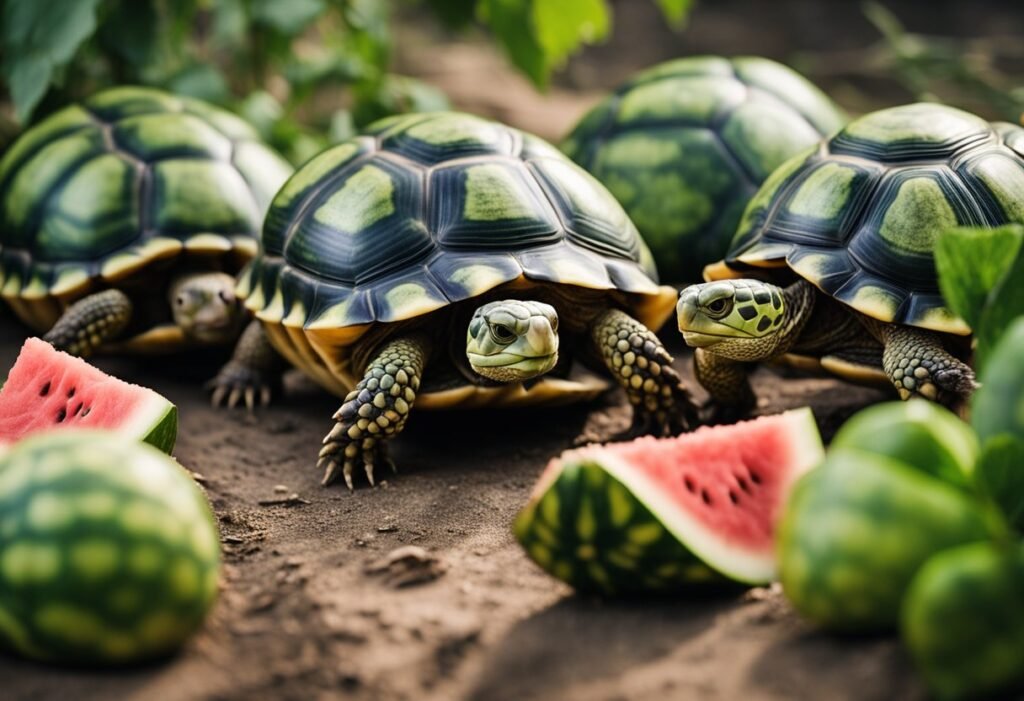
When it comes to feeding our pet tortoises, we always want to make sure that we are providing them with the best possible diet. One question that many tortoise owners have is whether or not their pet can eat watermelon. In this section, we will explore the nutritional value of watermelon and its water content to determine if it is safe for tortoises to eat.
Nutritional Value of Watermelon
Watermelon is a delicious and refreshing fruit that is packed with nutrients. It is a good source of vitamins A and C, which are essential for healthy eyes and a strong immune system. Watermelon also contains potassium, which is important for maintaining healthy blood pressure levels, and lycopene, which is a powerful antioxidant that can help protect against cancer and heart disease.
However, while watermelon is nutritious, it is not a complete diet for tortoises. Tortoises require a diet that is high in fiber and low in protein, and watermelon is low in fiber and high in sugar. Therefore, while it is safe for tortoises to eat watermelon in moderation, it should not be the main component of their diet.
Water Content in Watermelon
As their name suggests, tortoises require a lot of water to stay healthy. In the wild, they obtain most of their water from the plants they eat, but in captivity, it is important to provide them with a source of fresh water at all times. Watermelon is a fruit that is high in water content, with a water content of around 92%.
Feeding your tortoise watermelon can be a good way to help them stay hydrated, especially during hot weather when they may be more prone to dehydration. However, it is important to remember that watermelon should not replace their regular source of fresh water.
In conclusion, while watermelon is safe for tortoises to eat in moderation and can help them stay hydrated, it should not be the main component of their diet. As with any new food, it is important to introduce watermelon gradually and monitor your tortoise’s reaction to it.
Potential Risks and Dangers
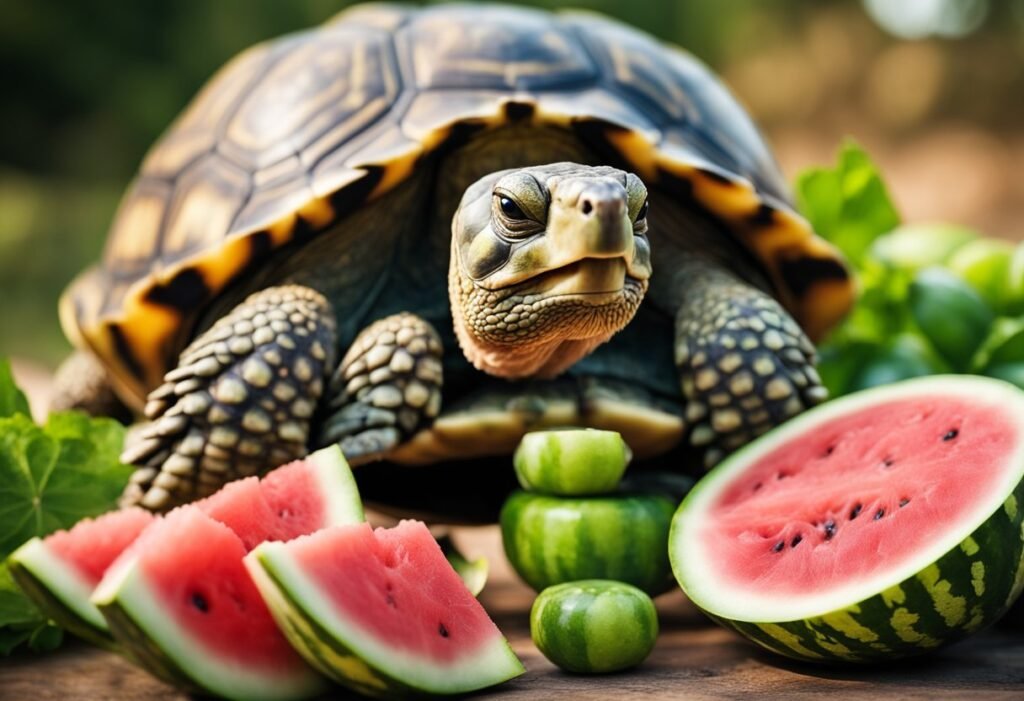
While watermelon is generally safe for tortoises to eat, there are a few potential risks and dangers to be aware of.
Firstly, watermelon is high in sugar and should only be fed in moderation. Overfeeding watermelon to your tortoise can lead to weight gain and other health problems.
Additionally, the seeds of the watermelon can be a choking hazard for tortoises. It is important to remove all seeds before feeding your tortoise watermelon.
Lastly, make sure to thoroughly wash the watermelon before feeding it to your tortoise. Pesticides and other harmful chemicals can be present on the skin of the fruit, which can be harmful to your tortoise if ingested.
Overall, while watermelon can be a healthy and tasty treat for your tortoise, it is important to be mindful of these potential risks and take the necessary precautions to keep your tortoise safe and healthy.
Serving Watermelon to Tortoises
When it comes to feeding tortoises, it’s important to ensure that they are getting the right nutrients in the right amounts. While watermelon can be a tasty treat for tortoises, it should not make up a significant portion of their diet. Here are some things to keep in mind when serving watermelon to tortoises.
Frequency and Quantity
Watermelon should be given to tortoises only occasionally as a treat. It should not be a regular part of their diet. Overfeeding watermelon can lead to digestive issues, such as diarrhea. In general, a few small pieces of watermelon once or twice a month is sufficient.
Preparation Method
Before serving watermelon to tortoises, it’s important to prepare it properly. First, make sure to wash the watermelon thoroughly to remove any dirt or debris. Then, remove the rind and cut the flesh into small, bite-sized pieces. It’s important to remove the seeds as well, as they can be a choking hazard for tortoises.
Overall, watermelon can be a tasty treat for tortoises when served in moderation. However, it should not make up a significant portion of their diet and should only be given occasionally. When serving watermelon, be sure to prepare it properly and remove any seeds to prevent choking.
Alternatives to Watermelon for Tortoises
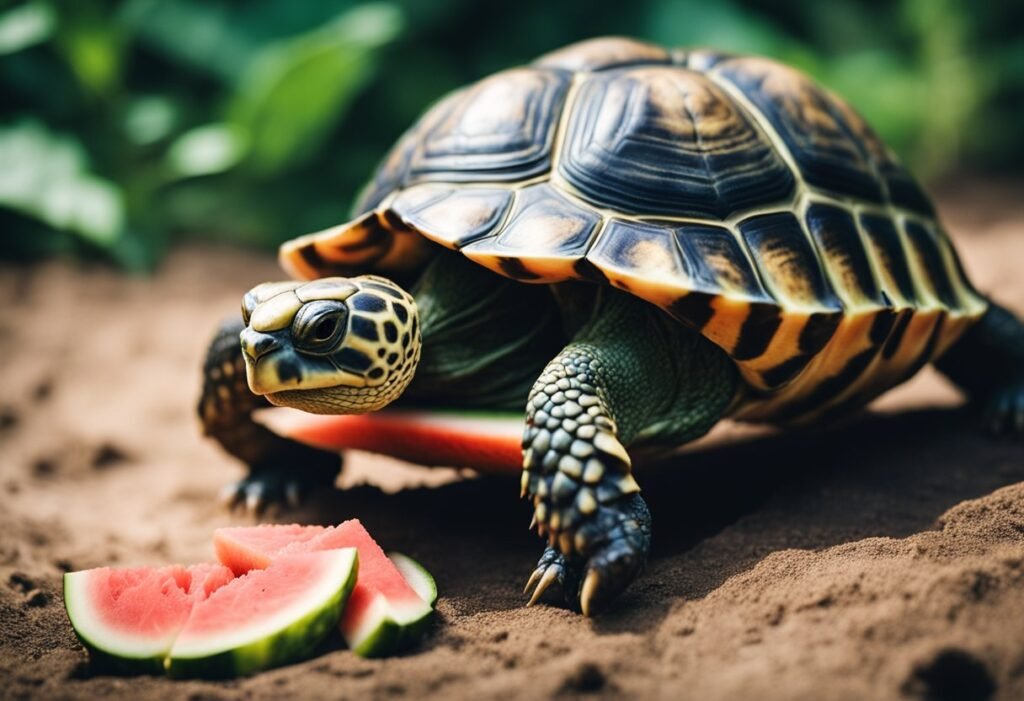
While watermelon can be a healthy treat for tortoises, it’s important to not overdo it due to its high sugar content. If you’re looking for other fruits to offer your tortoise, here are some alternatives to consider:
1. Berries
Berries like strawberries, raspberries, and blueberries are a great option for tortoises. They’re low in sugar and high in fiber, making them a healthy and tasty treat.
2. Apples
Apples are another fruit that tortoises can enjoy. Just be sure to remove the seeds and core before feeding them to your pet.
3. Leafy Greens
Leafy greens like kale, collard greens, and dandelion greens are an excellent source of nutrition for tortoises. They’re low in sugar and high in fiber, making them a great addition to your tortoise’s diet.
4. Squash
Squash, like butternut squash and pumpkin, are also a good option for tortoises. They’re low in sugar and high in fiber, making them a healthy treat.
When offering your tortoise any new food, it’s important to introduce it slowly and in small amounts to avoid digestive upset. Always consult with your veterinarian before making any changes to your pet’s diet.
Conclusion
In conclusion, while watermelon is not a typical food for tortoises, it can be given to them in small amounts as a treat. The high water content of watermelon can help keep your tortoise hydrated, but it should not replace their regular diet of leafy greens and vegetables.
It’s important to remember that moderation is key when it comes to feeding your tortoise any type of fruit. Too much sugar can lead to health problems such as obesity and diabetes. Additionally, the seeds and rind of watermelon should be removed before feeding to your tortoise, as they can be difficult for them to digest.
Overall, if you choose to give your tortoise watermelon, make sure it is offered in small amounts and as an occasional treat rather than a staple in their diet. As with any new food, it’s important to monitor your tortoise for any signs of digestive upset or other health issues.
Frequently Asked Questions
What fruits can tortoises eat besides watermelon?
Tortoises can eat a variety of fruits, including apples, bananas, berries, and melons. However, it’s important to remember that fruit should only make up a small part of a tortoise’s diet.
Is watermelon safe for desert tortoises to eat?
Yes, watermelon is safe for desert tortoises to eat in moderation. However, it should only be given as an occasional treat and not as a staple food.
Can marginated tortoises safely eat watermelon?
Yes, marginated tortoises can safely eat watermelon in moderation. However, it’s important to remove any seeds and cut the watermelon into small, bite-sized pieces to prevent choking.
Can red footed tortoises eat the rind of watermelon?
No, red footed tortoises should not eat the rind of watermelon as it can be difficult for them to digest. Only the flesh of the watermelon should be given as a treat.
What other types of melon can tortoises eat?
Tortoises can also safely eat other types of melon, such as cantaloupe and honeydew, in moderation. Again, it’s important to remove any seeds and cut the melon into small, bite-sized pieces.
Can Russian and leopard tortoises safely consume watermelon?
Yes, Russian and leopard tortoises can safely consume watermelon in moderation. However, as with other tortoise species, it should only be given as an occasional treat and not as a staple food.


